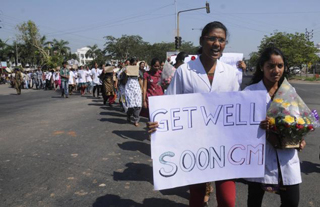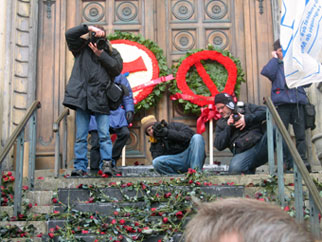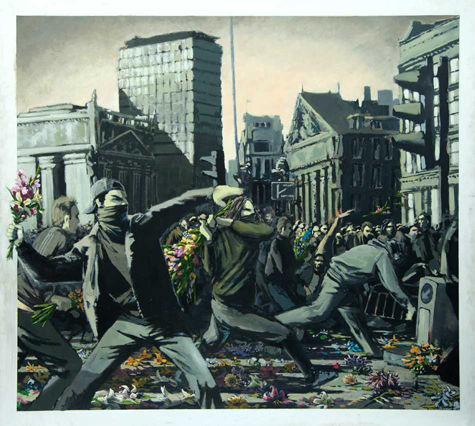Human Flower Project
Floral Demonstrations Grow Thorns
There’s a new spirit abroad in floral protests, not just “in your face” but “on your case.”

Striking junior doctors marched in Vijayawada, Andhra Pradesh Jan. 16 with “sympathy” flowers for the chief minister who has yet to meet their demands.
Photo: Raju. V
Are flowers the new pink slip?
Since 2004, we’ve been reporting on how flowers feature in protest across the world, from the pink gladioli brandished by Cuba’s Damas de Blanco, to bouquets laid outside Shanghai’s Google headquarters—when the government threatened to suspend the company’s operations in China.
In these demonstrations, flowers proudly identify the bearers (the pink gladiolus has become the emblem of the Cuban civil rights marchers) or they express solidarity with the recipient (for example, the Internet giant).
But increasingly, we see floral protests taking another form: rather than standing FOR an organization or being presented TO someone, they’re delivered AGAINST.
The most recent example comes from Andhra Pradesh, India. Last week, junior doctors (known in the U.S. as medical students, interns and residents) took flowers to the Chief Minister N. Kiran Kumar Reddy along with placards reading “Get well soon CM.”
The show of mock-sympathy was an early demonstration in the junior physicians’ strike, now in its 9th day. “The junior doctors have been boycotting elective duties since January 14, demanding regular payment and a hike of stipends, reduction of rural service, health insurance and improvement of emergency infrastructure.” (Interesting to note that Indian doctors don’t have health insurance!)
 City workers in Montreal sent funeral flowers to the mayor to protest the “death” of collective bargaining on a contract, 2/23/06.
City workers in Montreal sent funeral flowers to the mayor to protest the “death” of collective bargaining on a contract, 2/23/06.
Photo: Syndicat des Cols Bleus
In 2006, we reported on another delivery of flowers as opposition. The Cols Bleus (city workers) of Montreal brought both wreaths and single roses to the steps of city hall, to protest the suspension of collective bargaining on their contract.
In the same spirit as the junior doctors’ message of “Get Well,” the Montreal workers brought funeral wreaths to the city leadership. Threats? Not quite, but there’s more than a whiff of menace in these flower deliveries.
Similarly, white collar immigrant workers in the U.S. (many from India) heaped flowers on the leader of the U.S. Citizenship and Immigration Services, Emilio Gonzales, five years ago, to demand employer-sponsored green cards. On an immigrant workers’ listserv two years later, someone recommended another such floral protest, but there was little enthusiasm. “I will save those dollars instead of wasting on flowers,” writes one correspondent. “Nothing is going to happen.” Apparently, all those bouquets sent of Gonzales’s office were a flop.

The new spirit of flower protest, graphic by Banksy
Image: via humanitari
Deploying flowers against an enemy seems to have caught on especially in India after the film Lage Raho Munnabhai (2006). In the movie one character builds a public campaign to send an unscrupulous man red roses “to help him recover from the ‘disease of dishonesty.’” In the film, the movement’s even called “Get Well Soon, Lucky” (a message that’s considerably spookier coming as it now does, from doctors).
In India this phenomenon has become known as Gandhigiri for its purported inspiration in Gandhi’s philosophy of political non-violence. That’s a lofty claim.
We plan to keep an eye on these deliveries of flowers AGAINST. If public outpourings of blossoms offer a “cure” for dishonesty or an outlet for malice, this should be a banner year for flower sales in the U.S.

